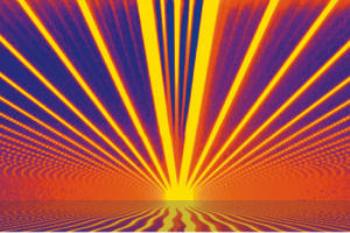Feb 13 2013
Writing in PNAS, University of Manchester graphene researchers found that sandwiching a layer of the wonder material between boron nitride could produce highly-accurate capacitors.
 Sun rising reflected on the sea made from the Landau level fan diagram
Sun rising reflected on the sea made from the Landau level fan diagram
Capacitors could pave the way for flexible and superstrong electronic devices.
Wonder material graphene was first isolated in 2004 at The University of Manchester by Professor Andre Geim and Professor Kostya Novoselov. Their work earned them the 2010 Nobel prize for Physics.
Graphene is the world’s thinnest, strongest and most conductive material, and has the potential to revolutionise a huge number of diverse applications; from smartphones and ultrafast broadband to drug delivery and computer chips.
Combining graphene with other materials, such as the ideal insulator boron nitride, has been a particular area of success for the Manchester researchers – creating heterostructures which have unique properties.
Capacitors made this way could prove cheaper and easier to make than traditional transistors. The team used quantum capacitance spectroscopy to investigate the exceptional properties of graphene, as this measurements shows better accuracy.
The University of Manchester is the world’s leading centre for graphene research. Work will begin shortly on the £61m National Graphene Institute, funded by the Engineering and Physical Sciences Research Council (EPSRC) and the European Regional Development Fund (ERDF).